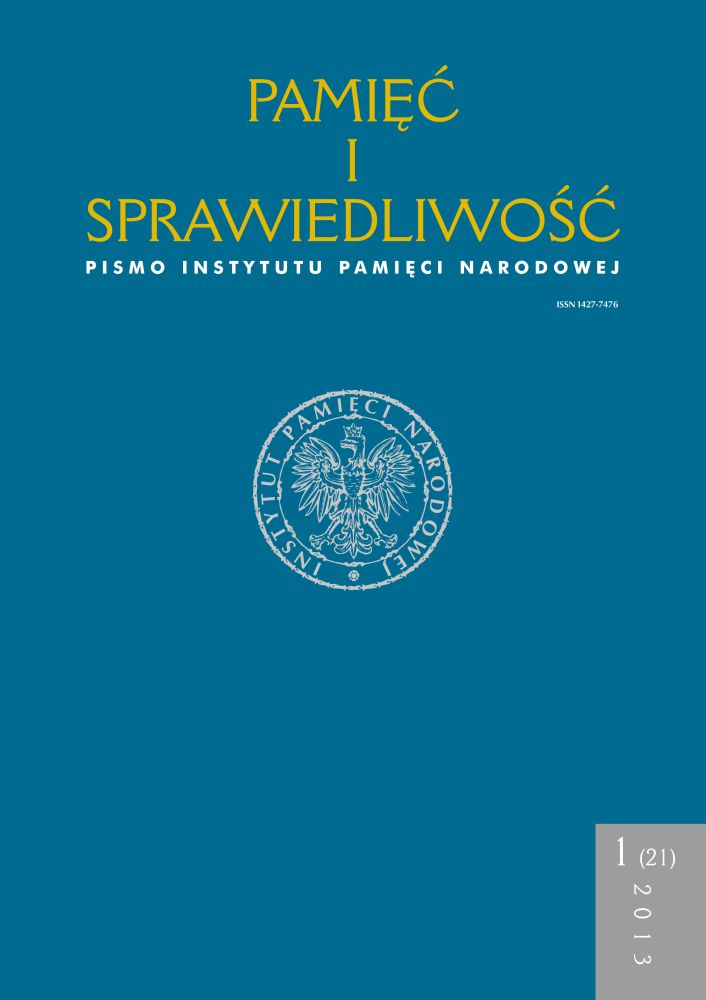The District Commission for the Investigation of Hitlerite Crimes in Gdańsk in the years 1965–1989. Origins and activity
Remembrance and Justice, Vol. 21 No. 1 (2013), pages: 245-274
Publication date: 2013-06-30
Abstract
References
F. Ryszka, Norymberga. Prehistoria i ciąg dalszy, Warszawa 1982, C. Pilichowski, Badanie i ściganie zbrodni hitlerowskich 1944–1974, Warszawa 1975, L. Gondek, Polska karząca 1939–1945. Polski podziemny wymiar sprawiedliwości w okresie okupacji niemieckiej, Warszawa 1988 Główna Komisja Badania Zbrodni przeciwko Narodowi Polskiemu. Informator, red. I. Borowicz, M. Pilarska, Warszawa 1997, E. Kobierska-Motas, Ekstradycja przestępców wojennych do Polski z czterech stref okupacyjnych Niemiec: 1946–1950, Warszawa 1991, t. 1, . P. Kładoczny, Prawo jako narzędzie represji w Polsce Ludowej 1944–1956, Warszawa 2004, C. Pilichowski, Działalność i wyniki pracy Głównej Komisji i Okręgowych Komisji Badania Zbrodni Hitlerowskich w Polsce 1944/45–1980, Warszawa 1980, E. Kęsik, Działalność Okręgowej Komisji Badania Zbrodni Hitlerowskich w Polsce, „Zeszyty Muzeum Stutthof ” 1981, z. 4, s. 5–12 A. Gałan, Okręgowa Komisja Badania Zbrodni przeciwko Narodowi Polskiemu w Lublinie 1944–1999, Lublin 2010, Protokół drugiego posiedzenia Prezydium Głównej Komisji Badania Zbrodni Niemieckiej w Polsce [w:] Główna Komisja Badania Zbrodni Niemieckich w Polsce i jej oddziały terenowe w 1945 roku. Wybór dokumentów, oprac. M. Motas, Warszawa 1995, s. 23–24, Do Prezydium Krajowej Rady Narodowej. Pierwsze sprawozdanie miesięczne Głównej Komisji Badania Zbrodni Niemieckich w Polsce [w:] Główna Komisja Badania Zbrodni Niemieckich w Polsce i jej oddziały terenowe w 1945 roku. Wybór dokumentów, oprac. M. Motas, Warszawa 1995, s. 28–29, G. Baziur, Armia Czerwona na Pomorzu Gdańskim w latach 1945–1947, Warszawa 2003 D. Schenk, Albert Forster gdański namiestnik Hitlera. Zbrodnie hitlerowskie w Gdańsku i Prusach Zachodnich, Gdańsk 2002, W. Borodziej, „Hitlerische Verbrechen”. Die Ahndung deutscher Kriegs- und Besatzungsverbrechen in Polen [w:] Transnationale Vergangenheitspolitik. Der Umgang mit deutschen Kriegsverbrechern in Europa nach dem Zweiten Weltkrieg, red. N. Frei, Göttingen 2006, s. 432–433, A. Weinke, Die Verfolgung von NS-Tätern im geteilten Deutschland. Vergangenheitsbewältigungen 1949–1969 oder: Eine deutsch-deutsche Beziehungsgeschichte im Klaten Krieg, Paderborn–München–Wien–Zürich 2002, A. Weinke, Eine Gesellschaft ermittelt gegen sich selbst. Die Geschichte der Zentrallen Stelle Ludwigsburg 1958–2008, Darmstadt 2009, K. Wóycicki, Niemiecki rachunek sumienia. Niemcy wobec przeszłości 1933–1945, Wrocław 2005, M. Zaremba, Komunizm, legitymizacja, nacjonalizm. Nacjonalistyczna legitymizacja władzy komunistycznej w Polsce, Warszawa 2005, K. Lesiakowski, Mieczysław Moczar „Mietek”. Biografia polityczna, Warszawa 1998, R. Kobylarz, Walka o pamięć. Polityczne aspekty obchodów rocznicy powstania w getcie warszawskim 1944–1989, Warszawa 2009 J. Huener, Auschwitz, Poland and the politics of commemoration, Athens 2004 Rejestr miejsc i faktów zbrodni popełnionych przez okupanta hitlerowskiego na ziemiach polskich w latach 1939–1945, oprac. Główna Komisja Badania Zbrodni Hitlerowskich w Polsce, Warszawa 1987, B. Bojarska, Piaśnica – miejsce martyrologii i pamięci. Z badań nad zbrodniami hitlerowskimi na Pomorzu, Gdańsk 1989 W. Jastrzębski, J. Sziling, Okupacja Hitlerowska na Pomorzu Gdańskim w latach 1939–1945, Gdańsk 1979, A. Męclewski, Neugarten 27: z dziejów gdańskiego gestapo, Warszawa 1974, M. Podgóreczny, Albert Forster: gauleiter i oskarżony, Gdańsk 1977, J. Rydel, Polityka historyczna lat 1945–1989 wobec Zachodu [w:] Polityka czy propaganda? PRL wobec historii, red. P. Skibiński, T. Wiścicki, Warszawa 2009, s. 179, D. Stola, Kraj bez wyjścia? Migracje z Polski 1949–1989, Warszawa 2010, M. Tomala, Patrząc na Niemcy. Od wrogości do porozumienia 1945–1991, Warszawa 1997 A. Dudek, Dzieje dziesięciomilionowej „Solidarności” (1980–1981) [w:] Droga do niepodległości. Solidarność 1980–2005, red. A. Borowski, Warszawa 2005, s. 61–63, Obozy hitlerowskie na ziemiach polskich 1939–1945. Informator encyklopedyczny, red. Czesław Pilichowski et al. ,Warszawa 1979, Rejestr miejsc i faktów zbrodni popełnionych przez okupanta hitlerowskiego na ziemiach polskich w latach 1939–1945. Województwo gdańskie, Warszawa 1987, J. Matynia, Na szlakach walki i męczeństwa województwa gdańskiego, Gdynia 1967, K. Ciechanowski, Stutthof – hitlerowski obóz koncentracyjny, Warszawa 1988, A. Męclewski, Pelplińska jesień, Gdańsk 1971, A. Świtalski, Zbrodnia usankcjonowana: skazanie na śmierć obrońców Poczty Polskiej w Gdańsku w świetle prawa, Wrocław–Warszawa–Kraków–Gdańsk 1979
Most read articles by the same author(s)
- Łukasz Jasiński, Post-war Retributions in Czechoslovakia, 1945–1948 Legal Process and Political Background , Remembrance and Justice: Vol. 24 No. 2 (2014)
 Język Polski
Język Polski
 English
English
 Deutsch
Deutsch
 Français (France)
Français (France)
 Italiano
Italiano
 Русский
Русский


 PDF (Język Polski)
PDF (Język Polski)
